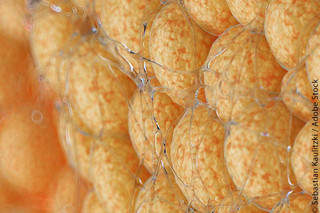A research team led by Dr Martin Mollenhauer from the Heart Center at University Hospital Cologne has investigated the link between obesity and the risk of cardiovascular disease in greater detail. The researchers have discovered that in obese patients and in mouse models, increased levels of the oxidative enzyme myeloperoxidase (MPO) are associated with poorer vascular function. The results of the research have been published under the title ‘Myeloperoxidase impacts vascular function by altering perivascular adipocytes’ secretome and phenotype in obesity’ in Cell Reports Medicine.
In people suffering from obesity, MPO is active in a particular form of fatty tissue surrounding the aorta. This fatty tissue is called perivascular adipose tissue (PVAT). MPO promotes inflammatory processes in PVAT and at the same time inhibits protective mechanisms that normally keep the blood vessels elastic and healthy.
In order to obtain a more precise understanding of the underlying mechanism, the effects of the absence of MPO were investigated in small animal models. “Interestingly, mice without MPO exhibited better vascular function, fewer signs of inflammation within the PVAT and a conversion of fatty tissue into a more active, energy-consuming form. In addition, there was an increase in the release of the hormone adiponectin, which protects the blood vessels,” explains Martin Mollenhauer.
The results suggest that targeted inhibition of MPO may be a promising new therapeutic approach for people with obesity and increased cardiovascular risk. However, further studies must be carried out before this type of obesity therapy can be applied.
Media Contact:
PD Dr Martin Mollenhauer
Experimental Cardiology
Clinic III for Internal Medicine
Heart Center at University Hospital Cologne
+49 221 478 87402
Press and Communications Team:
Mathias Martin
+49 221 470 1705
m.martinverw.uni-koeln.de
Publication:
https://www.sciencedirect.com/science/article/pii/S2666379125001600
